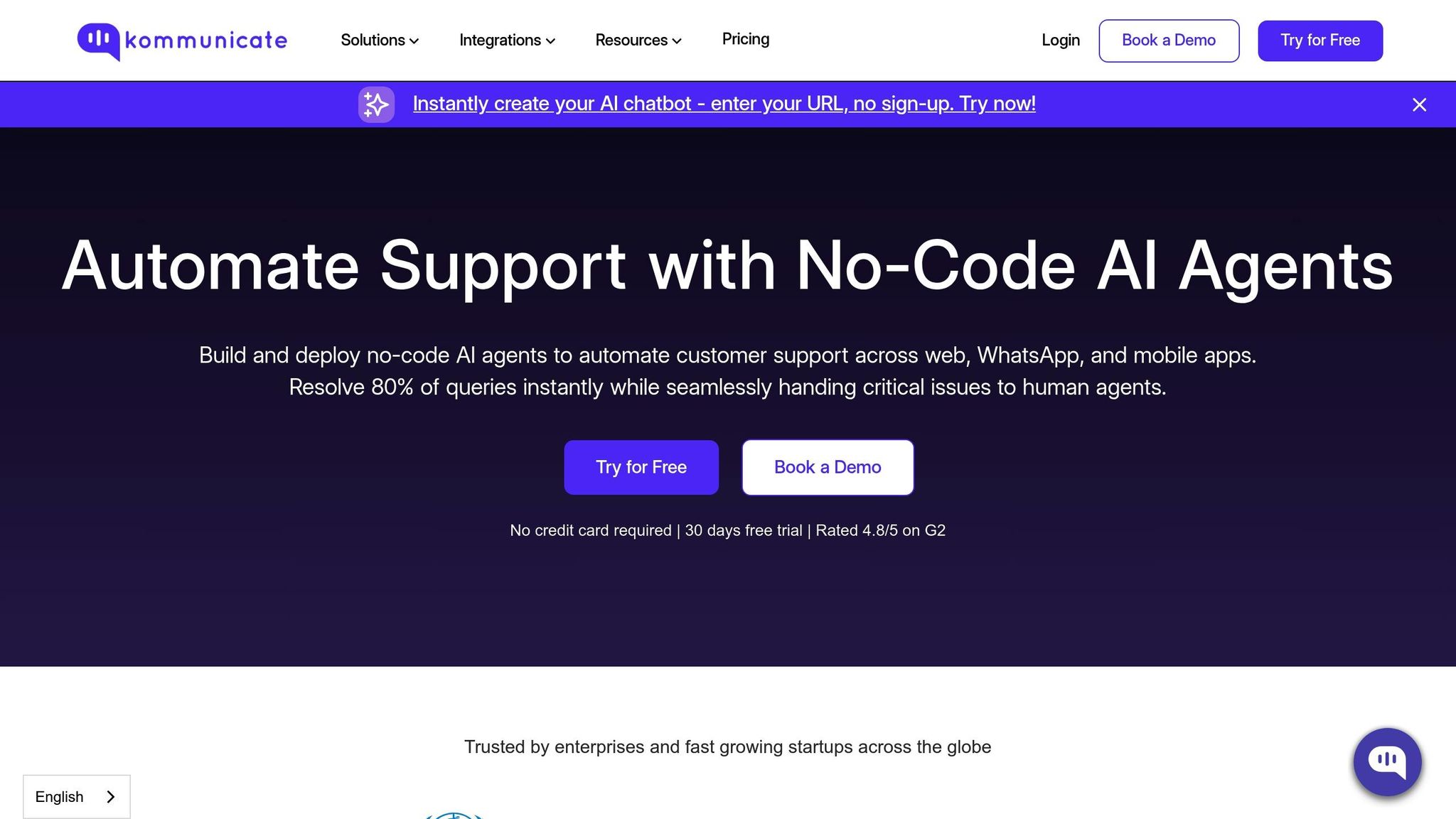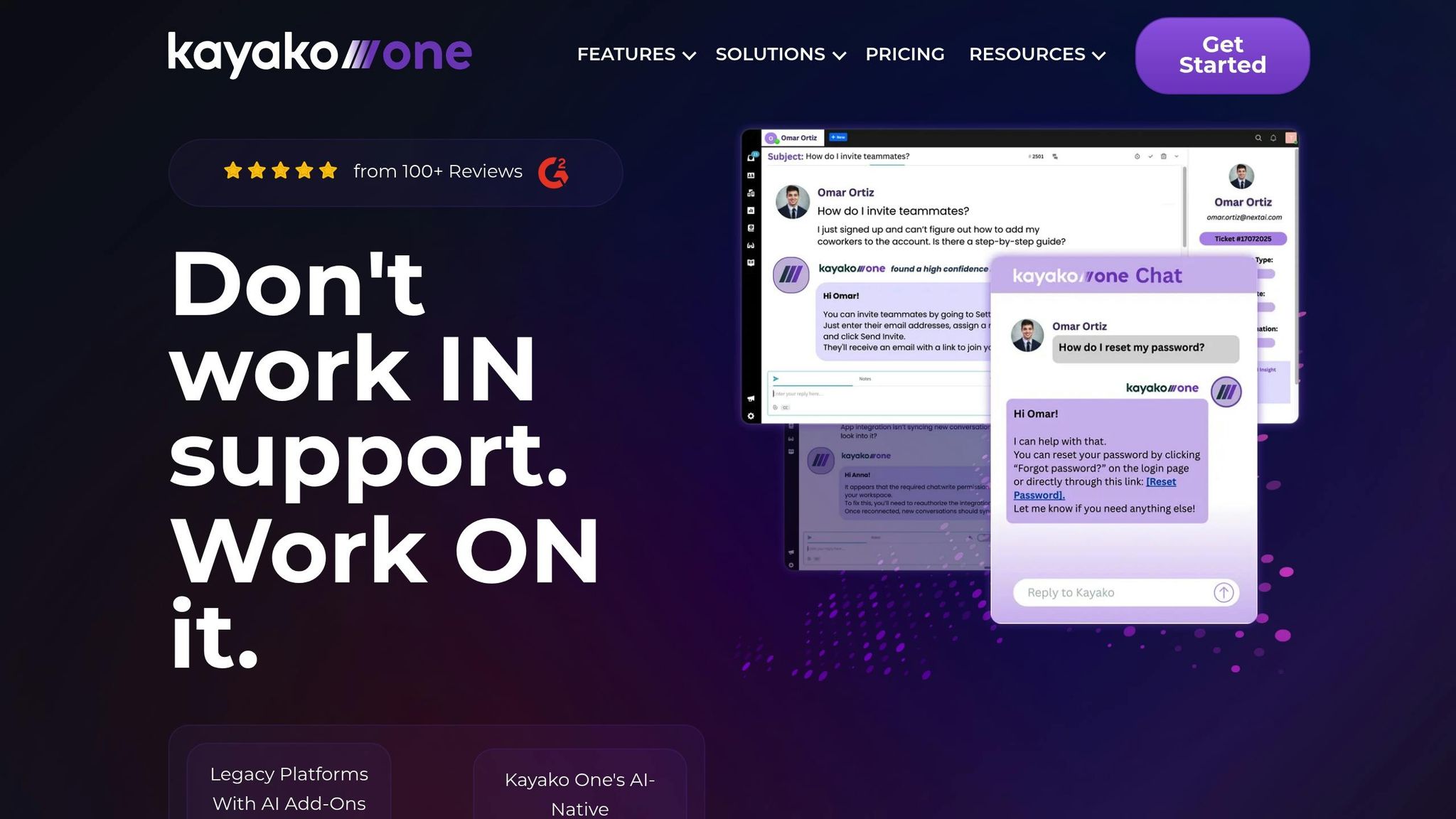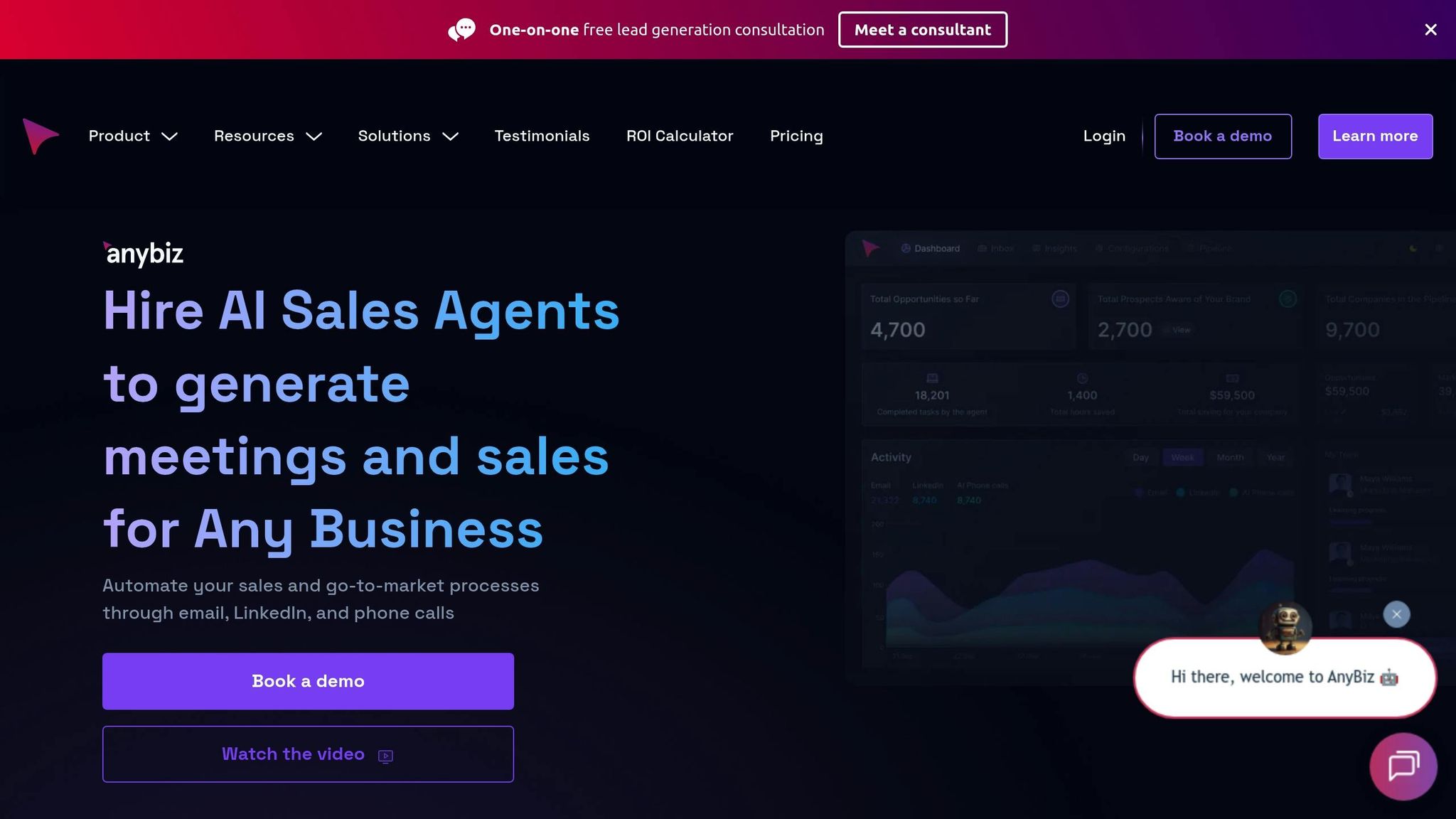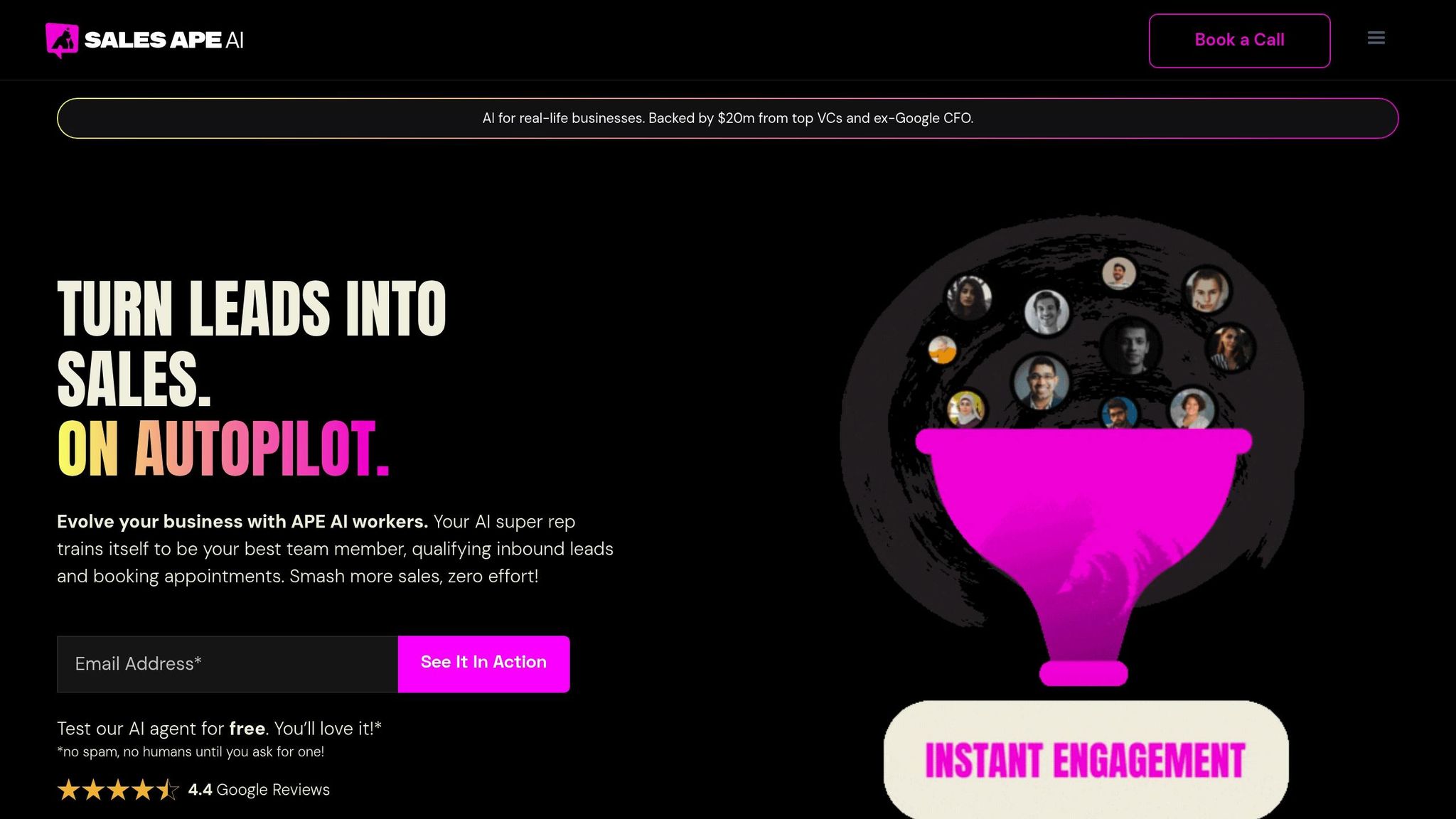In 2025, SaaS companies face growing challenges like slowing lead generation, inconsistent marketing, and overwhelmed sales teams. The solution? AI-powered tools that handle repetitive tasks, optimize workflows, and improve decision-making. These tools help businesses scale faster while freeing teams to focus on strategy and customer relationships.
Here’s a quick look at 7 essential AI tools driving SaaS growth in 2025:
- Top SaaS & AI Tools Directory: A curated hub for discovering AI tools that integrate seamlessly with existing systems.
- Kommunicate: Combines AI chatbots and live agents for efficient customer support.
- Kayako: Centralizes communication channels to improve customer service.
- HubSpot Service Hub: Unifies marketing, sales, and support with integrated CRM capabilities.
- Freshdesk: Scalable customer support with multi-channel ticketing and analytics.
- AnyBiz AI Sales Agent: Automates lead generation and outreach across multiple channels.
- SalesApe AI: Manages sales pipelines with AI-driven insights and automation.
Quick Comparison:
| Tool | Focus Area | Standout Feature | Starting Price |
|---|---|---|---|
| Top SaaS & AI Directory | AI tool discovery | Pre-vetted tools for SaaS | Waitlist |
| Kommunicate | Customer support | Hybrid AI-human chat system | $30/month |
| Kayako | Customer communication | Unified multi-channel support | $15/agent/month |
| HubSpot Service Hub | Sales & support | Full CRM integration | $45/month |
| Freshdesk | Customer support | Multi-channel ticketing | $15/agent/month |
| AnyBiz AI Sales Agent | Sales automation | AI-powered outreach | Custom pricing |
| SalesApe AI | Sales pipeline | Dynamic lead prioritization | Custom pricing |
These tools are transforming how SaaS companies operate by automating workflows, improving customer engagement, and driving growth. If you're looking to stay competitive in 2025, adopting these AI solutions is a smart move.
3 Best AI SaaS Software Tools 2025 (Resell Profitable AI SaaS Products)
1. Top SaaS & AI Tools Directory (agilegrowthlabs.com)
The Top SaaS & AI Tools Directory is a carefully curated resource designed to connect businesses with AI tools that can supercharge SaaS growth. It’s a one-stop hub for discovering tools that streamline essential functions like lead generation, sales optimization, and marketing automation. Essentially, it acts as a bridge between traditional SaaS platforms and the latest in AI technology.
Automation Capabilities
Finding the right AI tools can feel like searching for a needle in a haystack. This directory takes the hassle out of the process by offering a pre-vetted selection of tools. These are designed to simplify operations, improve customer engagement, and even support strategies for increasing recurring revenue. It’s all about helping SaaS companies work smarter, not harder.
Integration with SaaS Platforms
What makes this directory stand out is its focus on tools that integrate effortlessly with existing systems. Whether you’re using popular CRM platforms, email marketing tools, or customer engagement software, these AI solutions are built to fit right in. This means businesses can adopt advanced technologies without needing to overhaul their current workflows - saving both time and resources.
Personalization Features
Beyond its directory of tools, the platform offers something extra: exclusive founder services. Through a waitlist, users can access tailored training sessions and personalized SaaS tool recommendations, ensuring they get the most out of their AI investments.
2. Kommunicate

Kommunicate streamlines customer support by combining AI-powered chatbots with live agents, addressing inefficiencies that can slow down operations and drain resources. By merging live chat, chatbots, and helpdesk tools into one platform, it ensures round-the-clock support without the need for additional staffing.
What sets Kommunicate apart is its hybrid approach. Instead of relying solely on either AI or human agents, it offers a smooth transition between automated responses and live support. This means customers get quick answers to routine questions, while more complex issues are passed on to human experts.
Automation Capabilities
Kommunicate's AI chatbots are designed to handle everyday customer inquiries independently. Tasks like checking order statuses, answering billing questions, or troubleshooting simple issues are managed seamlessly. For instance, if a customer asks about their subscription, the bot can pull real-time details directly from an integrated CRM.
When an issue becomes too complex or a customer expresses frustration, the system uses smart routing to transfer the query to a live agent, complete with full context for a smooth handover.
The platform also uses automated workflows triggered by specific actions or keywords. For example, if a customer mentions "cancel subscription", the system might offer retention options like discounts or schedule a call with the customer success team to address concerns, helping reduce churn.
Integration with SaaS Platforms
Kommunicate integrates effortlessly with widely-used SaaS tools like Salesforce, HubSpot, Zendesk, and Slack. By syncing with your CRM, it provides support agents with a complete view of customer profiles, including subscription details, past support tickets, and purchase history.
It also works with payment processors such as Stripe and PayPal, as well as subscription management platforms like ChargeBee and Recurly. This allows the system to display real-time subscription statuses and lets customers modify their plans directly.
For companies with proprietary software, Kommunicate offers API connections to enable custom integrations. This provides development teams access to internal tools, product usage data, and account-specific details.
Personalization Features
Kommunicate enhances interactions by using customer history and data for personalization. Returning customers benefit from continuity, as the platform references past interactions to provide tailored responses.
Dynamic templates and real-time sentiment analysis further refine customer interactions, ensuring responses align with each customer's needs and tone.
Scalability for Business Growth
As businesses grow, Kommunicate scales effortlessly to match their needs without requiring a proportional increase in support staff. Its multi-language support makes it ideal for companies expanding into global markets, eliminating the need to hire region-specific teams.
The platform’s analytics dashboard provides insights into key metrics like response times, resolution rates, and customer satisfaction scores. These insights help businesses fine-tune their operations and maintain efficiency as they grow. By automating support, Kommunicate plays a key role in driving the growth strategies of SaaS companies in 2025.
3. Kayako

Kayako brings all your support channels - email, live chat, social media, and phone - into one platform. This means agents can keep conversations flowing without needing customers to repeat themselves. By unifying communication, SaaS companies get the context they need to provide outstanding support, even as they grow.
Automation Capabilities
Kayako’s automation tools take care of repetitive tasks that often eat up agents’ time. It can automatically sort tickets, assign them to the right agents, and prioritize them. Common issues like password resets or billing questions? Handled with minimal human effort.
The smart routing feature is a game-changer. It looks at customer data, the complexity of the issue, and the expertise of agents to ensure tickets are sent to the best person for the job - right away.
Kayako also uses automated follow-ups to keep customers happy after their issues are resolved. It can send personalized emails asking for feedback, offering helpful resources, or even reaching out proactively if similar problems pop up for other users. This level of automation makes it easy to integrate with the tools SaaS companies rely on.
Integration with SaaS Platforms
Kayako connects seamlessly with popular tools like Salesforce, HubSpot, and Stripe, giving agents instant access to customer profiles and real-time billing details. This integration helps resolve issues faster.
Through Slack integration, teams stay in sync. Updates about critical tickets, escalations, or customer feedback are automatically posted in relevant channels. For example, developers can get real-time bug report notifications, while customer success managers are alerted to accounts that may need extra care.
If your team works with project management tools like Asana or Jira, Kayako can automatically create tasks or bug reports based on customer feedback. This ensures product improvements are directly informed by what users actually need.
Personalization Features
Kayako goes beyond automation by personalizing every customer interaction. It uses data from past conversations, purchase history, and usage patterns to suggest solutions - sometimes before the customer even finishes explaining the issue.
Agents get access to dynamic profiles that highlight key customer details, like frequently used features or changes in behavior, allowing them to craft more effective responses.
The platform’s sentiment analysis keeps an eye on the tone of customer messages. Frustrated customers are flagged for priority handling, while satisfied ones might be identified as candidates for case studies or referrals.
Customizable response templates ensure communications are tailored to the recipient. For example, a technical administrator might receive a detailed troubleshooting guide, while an end user gets a simpler, step-by-step explanation of the same issue.
Scalability for Business Growth
Kayako is built to scale alongside growing SaaS companies. Its ticket distribution algorithms spread workloads evenly across agents, ensuring quick response times - even during busy periods.
For businesses managing multiple brands or products, multi-brand support offers separate support experiences while sharing resources like knowledge bases. This is especially helpful for companies that expand through acquisitions or launch new product lines.
The platform’s analytics dashboard provides insights into key metrics like first-contact resolution rates and average response times. These insights help companies pinpoint areas for improvement and prove the value of their support efforts.
Kayako also keeps self-service resources up to date with knowledge base automation. By learning from resolved tickets, it suggests new articles or updates to existing ones, ensuring customers always have access to relevant information as products evolve. These scalable features not only streamline support but also help SaaS companies grow efficiently in 2025.
4. HubSpot Service Hub
HubSpot Service Hub brings customer service together by offering a complete view of every customer interaction. It seamlessly connects with HubSpot CRM, providing a full history of customer engagement. This integration helps align workflows across marketing, sales, and support, creating a more unified approach to customer management.
Integration with SaaS Platforms
Service Hub works effortlessly with HubSpot CRM and popular tools like Jira, Slack, Zendesk, and Salesforce, offering a comprehensive view of customer data while keeping team communications aligned[2]. Its ability to consolidate customer information and communication channels helps SaaS companies make quicker, more informed decisions[3].
"We're able to create a cohesive customer experience across marketing, sales, and customer success engagements with HubSpot, making it easy to launch and validate new programs quickly. As Zapier continues to grow, we love how we've been able to scale our setup to match our changing needs." - Giancarlo Lionetti, Chief Revenue Officer, Zapier [1]
sbb-itb-9cd970b
5. Freshdesk
Freshdesk is designed to grow alongside SaaS businesses, adapting to increasing customer service needs. Its user-friendly interface ensures that even as support requests multiply, service quality remains consistent. Plus, it integrates smoothly with AI tools, making it a solid choice for managing customer support while scaling operations.
6. AnyBiz AI Sales Agent

AnyBiz AI Sales Agent is changing the game for lead generation and sales outreach with its AI-powered automation. Acting like a tireless sales development representative, it takes care of everything from finding potential clients to initiating conversations.
With access to a database of over 400 million prospects, the platform uses AI-driven intent detection to zero in on leads most likely to convert for your business. Plus, its real-time website visitor tracking identifies who’s checking out your site and instantly turns them into qualified leads through targeted outreach campaigns.
Automation Capabilities
AnyBiz automates outreach across multiple channels, including email, LinkedIn, and even AI-powered cold calls. If you’re on the Expert plan, the platform does the heavy lifting: setting up domains, sending out up to 5,000 hyper-personalized emails monthly, monitoring deliverability, fixing issues, and creating contextual content based on social media insights. It also handles responses and follow-ups.
On LinkedIn, AnyBiz takes care of outreach, message replies, and follow-ups, while also boosting your brand’s presence with automated posts. Its cold-calling feature is equally impressive, making up to 1,000 calls per month with tailored scripts and dedicated phone numbers.
The AI agents can sort responses into seven categories and send initial replies, leaving your sales team free to focus on closing deals. So far, the platform has sent over 1.5 billion messages, booked more than 120,000 meetings, and improved connection rates by 85%. These automation tools are part of a larger AI-driven ecosystem that’s fueling SaaS growth in 2025.
Integration with SaaS Platforms
AnyBiz works effortlessly with the tools SaaS companies already rely on. It integrates with top CRM and productivity platforms like HubSpot, Salesforce, Zoho, Monday, Intercom, and Asana, creating a streamlined workflow that eliminates data silos.
Your team also stays in the loop with real-time opportunity alerts sent via WhatsApp, SMS, and Slack, ensuring no deal slips through the cracks.
Personalization Features
AnyBiz goes beyond standard personalization by creating custom landing pages tailored to each prospect. These pages are designed to engage visitors by addressing their specific needs, driving higher conversion rates. The platform also uses social media insights to craft content that feels personal - whether it’s an email subject line, a LinkedIn connection request, or a cold call script.
Scalability for Business Growth
Whether your business is just starting or scaling rapidly, AnyBiz grows with you. Its tiered plans support outreach capacities from 1,500 to 8,000 leads per month, with custom options for larger enterprises. Users have reported a 391% ROI and a 350% jump in monthly opportunities. By analyzing billions of data points every hour, the system keeps evolving, fine-tuning its strategies to match market trends and prospect behavior.
7. SalesApe AI

SalesApe AI rounds out our list, redefining how SaaS companies manage their sales pipelines. Acting like a virtual sales team, this AI-driven platform handles tasks ranging from prospect research to closing deals, making it easier for businesses to expand their sales operations.
Automation Capabilities
The system takes automation to the next level. It identifies and prioritizes prospects based on their likelihood to convert, then sends personalized email sequences at just the right time. On top of that, its conversation intelligence analyzes sales calls to extract actionable insights, schedule follow-ups, update CRM records, and even draft proposals.
SalesApe AI also adapts its lead nurturing strategies in real time. For example, it tailors messages based on actions like email opens or website visits. It simplifies pipeline management by automatically updating deal stages, predicting close probabilities, and flagging key opportunities for your team to act on.
This level of automation ensures smooth data sharing across your existing tools.
Integration with SaaS Platforms
SalesApe AI connects seamlessly with popular CRMs like Salesforce, HubSpot, Pipedrive, and Microsoft Dynamics. It also integrates with marketing tools such as Marketo and Pardot, as well as communication apps like Slack, Microsoft Teams, and Zoom, ensuring updates are logged automatically and customer journeys are streamlined.
Additionally, it syncs with accounting platforms like QuickBooks and Xero, bridging the gap between sales and billing. Its API-first design allows for efficient data sharing, including automatic logging of meeting notes and deal progress updates.
Personalization Features
When it comes to outreach, SalesApe AI excels at personalization. By analyzing digital footprints, it crafts messages that resonate with each prospect’s industry, company size, and recent activities. As prospects engage, the platform adjusts its content dynamically to match their level of interest.
Scalability for Business Growth
SalesApe AI grows alongside your business. Its flexible infrastructure handles peak periods effortlessly, while its machine learning algorithms get smarter with more data, delivering even better results over time.
For larger enterprises, the platform offers advanced features like multi-team management, detailed reporting dashboards, and custom workflow builders, making it a powerful tool for managing complex sales processes.
Tool Comparison Chart
Selecting the best AI automation tool for your SaaS company means carefully examining each tool's standout features. The chart below provides a clear breakdown to help guide your decision-making process.
| Tool | Automation Features | Integration Options | Personalization | Growth Potential | Pricing |
|---|---|---|---|---|---|
| Top SaaS & AI Tools Directory | Lead generation, sales optimization, marketing automation, AI agents for recurring revenue | CRM systems, email platforms, analytics tools | AI-driven content creation, targeted recommendations | High – comprehensive marketplace solutions | Waitlist available |
| Kommunicate | Chatbot workflows, ticket routing, automated responses, conversation analytics | Slack, Zendesk, Salesforce, WhatsApp, Facebook Messenger | Dynamic flows, behavioral triggers | Medium – focused on customer support automation | Starting at $30/month |
| Kayako | Ticket automation, SLA management, workflow triggers, reporting dashboards | Email, social media, live chat, third-party apps | Customer journey mapping, contextual responses | Medium – customer service specialization | Starting at $15/agent/month |
| HubSpot Service Hub | Ticketing system, knowledge base automation, customer feedback loops | Native CRM integration, 500+ app marketplace connections | Smart content, lifecycle stage targeting | High – full-stack growth platform | Starting at $45/month |
| Freshdesk | Multi-channel ticketing, escalation rules, time tracking, performance analytics | Shopify, Salesforce, Mailchimp, Slack, Microsoft Teams | Custom fields, automated assignment rules | Medium-High – scalable support operations | Starting at $15/agent/month |
| AnyBiz AI Sales Agent | Prospect identification, email sequences, lead scoring, pipeline management | CRM platforms, email marketing tools, communication apps | AI-powered message crafting, behavioral adaptation | High – end-to-end sales automation | Custom pricing |
| SalesApe AI | Prospect research, conversation intelligence, deal prediction, automated follow-ups | Salesforce, HubSpot, Pipedrive, Marketo, QuickBooks | Digital footprint analysis, dynamic content adjustment | High – comprehensive sales pipeline automation | Custom pricing |
Key Considerations for Selection
This chart highlights the core strengths of each tool, offering a side-by-side look at their features. Pricing is a critical factor: tools like Freshdesk and Kayako provide affordable per-agent plans starting at $15 per month, making them appealing to smaller teams. On the other hand, platforms like HubSpot Service Hub come with higher starting costs but deliver a robust suite of features across sales, marketing, and service operations.
Integration options are equally important. HubSpot Service Hub stands out with its extensive app marketplace, offering over 500 connections for seamless integration in complex SaaS setups. Similarly, SalesApe AI provides strong compatibility with popular CRM and business tools. Meanwhile, specialized tools like Kommunicate excel in customer support automation but may require supplementary platforms to address broader business needs.
Personalization is another key factor for SaaS companies focused on boosting conversions. AI-driven tools like SalesApe AI and AnyBiz AI Sales Agent offer advanced capabilities such as behavioral adaptation and dynamic content creation, which can significantly enhance customer engagement.
Finally, growth potential varies based on the tool's scalability and feature set. Full-stack solutions like Top SaaS & AI Tools Directory and HubSpot Service Hub are designed to support multiple growth areas simultaneously, while focused tools like Kayako or Kommunicate excel in niche applications. Many successful SaaS companies combine specialized tools with comprehensive platforms to create a balanced and efficient tech stack.
Conclusion
AI automation is quickly becoming the defining factor for SaaS companies aiming to thrive in 2025. These tools tackle core growth challenges like lead generation, sales pipeline management, and customer support. By addressing issues such as lead shortages, sluggish sales processes, and inefficient support systems, they pave the way for scalable growth.
What makes these tools even more appealing is their pricing flexibility and ability to integrate seamlessly with existing systems like CRMs, email platforms, and analytics tools. This compatibility allows businesses to build robust automation ecosystems capable of managing everything from capturing leads to ensuring customer success. Many top-performing SaaS companies are already combining several tools from this list to cover all their bases.
The key advantage lies in acting now. AI automation tools are advancing rapidly, and early adopters consistently outperform competitors who hesitate. With these insights in hand, you’re in a position to reshape your operations and gain a strategic edge.
The next steps? Choose the right tool, define measurable goals, and start implementing without delay. SaaS leaders in 2025 aren't waiting - they're using AI automation to set the rules of the game.
FAQs
How do AI tools like Kommunicate and Kayako improve customer support for SaaS companies in 2025?
In 2025, AI tools like Kommunicate and Kayako are changing the game for SaaS companies by making customer support faster and more efficient. Kommunicate uses generative AI to handle responses across various channels, such as email and live chat, ensuring quick and consistent interactions with customers.
Meanwhile, Kayako takes a different approach by using AI to provide personalized support, anticipate what customers might need, and solve problems more efficiently. These tools don’t just cut down on operational costs - they also boost customer satisfaction with real-time, tailored assistance. This gives SaaS companies an edge in today’s rapidly changing market.
How do the AI tools featured in the article integrate with SaaS platforms, and what advantages do they offer?
The AI tools discussed here are built to work effortlessly with existing SaaS platforms, bringing features like AI-driven chatbots, predictive analytics, and workflow automation into the mix. They sync with your current systems to boost productivity and deliver practical insights.
With these tools, you can automate routine tasks, create personalized user experiences, and make more informed decisions. This means SaaS businesses can simplify operations, engage customers more effectively, and achieve growth that scales. The payoff? Smoother workflows, smarter use of resources, and a sharper edge in a competitive market.
How can SaaS companies choose the right AI tool to meet their growth goals?
To pick the best AI tool, SaaS companies should first pinpoint their specific growth hurdles. Are you looking to boost lead generation, simplify marketing automation, or fine-tune sales processes? Knowing your priorities makes it easier to focus on tools that meet those needs.
Next, look at key factors like how well the tool integrates with your current systems, its ability to grow with your business, and whether it aligns with your goals. Don't forget to dig into details like data security, compliance with industry regulations, and customization options - these elements are crucial for meeting long-term objectives.
Finally, take the time to compare features and see how the tool fits into your existing workflows. A careful evaluation ensures you’ll land on a solution that truly works for your business.



